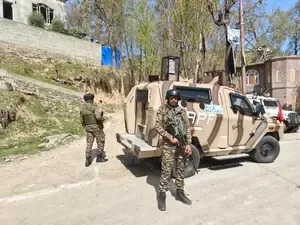What Role Did Operation Mahadev Play in Exposing the ISI-Backed Lashkar-e-Tayiba Plot Behind the Pahalgam Massacre?

Synopsis
Key Takeaways
- Operation Mahadev revealed the ISI's involvement in the Pahalgam attack.
- The mastermind, Sulaiman, was trained by the Pakistani Army.
- Local involvement was minimal and limited to providing logistical support.
- The attack aimed to create communal discord in Jammu and Kashmir.
- The operation emphasizes the ongoing threat of terrorism in the region.
New Delhi, July 28 (NationPress) The involvement of the Pakistan Army in the tragic Pahalgam terror attack that resulted in 26 fatalities has become increasingly evident following the elimination of a key figure, Sulaiman, by Indian security forces. Sulaiman, a member of Lashkar-e-Tayiba and known by the alias Hashim Moosa, was an ex-official of the Pakistani military and was killed during Operation Mahadev, a joint effort by the CRPF and Jammu and Kashmir police.
In the course of this operation, security forces also neutralized two other terrorists, Abu Hamza and Yasir. The official X account of the Indian Army’s Chinar Corps stated, "Three terrorists have been neutralized in an intense firefight. Operation Continues."
The demise of Sulaiman solidifies the assertion that the ISI played a significant role in orchestrating the Pahalgam attack. Sulaiman was a highly skilled terrorist and a valuable asset of the ISI, brought in for his expertise, honed during his time in the Pakistani military.
Investigations into the Pahalgam attack revealed that both the ISI and Lashkar-e-Tayiba were behind the operation, which was meticulously planned to ensure secrecy by employing exclusively Pakistani terrorists.
Initially, the involvement of some locals was suspected; however, the investigation revealed they were unaware of the attack, having only provided shelter and food.
Leading up to the attack, the ISI enlisted Sajid Jutt to ensure that only Pakistani fighters were involved, deliberately excluding local participants to maintain operational confidentiality. Jutt was tasked with identifying Lashkar-e-Tayiba terrorists in the Valley.
The attack squad was headed by Sulaiman, a member of the Pakistan Army's special forces, who had been active in the Valley since 2022 after training at the Muridke camp for Lashkar-e-Tayiba.
In the aftermath of the Pahalgam attack, India executed Operation Sindoor, targeting Muridke, the primary training facility for Lashkar-e-Tayiba.
Investigations confirmed that Sulaiman was present in the Tral forest as of April 15, positioning him near the attack site at Baisaran approximately a week prior to the assault.
According to investigative agencies, Sulaiman was also linked to the April 2023 ambush of an army truck in Poonch, resulting in the deaths of five soldiers.
While locals Parvaiz Ahmad Jothar and Bashir Ahmad Jothar were arrested, their role was limited to providing shelter, food, and logistics for a small sum of money. During questioning, they stated they were unaware of the details of the attack.
This indicates the desire for secrecy among the ISI and Lashkar-e-Tayiba, who meticulously planned the strike on a need-to-know basis. The Pahalgam attack was evidently designed to instigate significant communal discord and disrupt the flourishing tourism sector in Jammu and Kashmir following the abrogation of Article 370.










